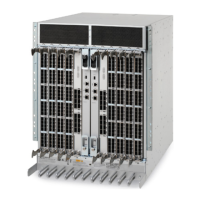Hardware components
The device has a modular and scalable mechanical construction that allows a wide range of exibility in installation, fabric design, and
maintenance. The chassis can be mounted with the cables facing the front of the equipment rack or to the rear, and consists of the
following:
• Up to eight hot-swappable port blade assemblies that can be congured in a single chassis, delivering up to 512 16-Gbps
Fibre Channel ports .
• Two slots for control processor blades (CP8):
– A single active CP8 blade can control all the ports in the chassis.
– The standby CP8 blade assumes control of the chassis if the active CP fails.
• Two slots for core switch blades (CR16-8):
– CR16-8 blade interconnects all port blades.
– Inter-chassis link (ICL) connectors to connect to as many as nine neighboring chassis using Fabric OS v7.0.1 or later. Only
six chassis can be connected using Fabric OS v7.0.0.
– Both CR16-8 blades are active.
• Modular, hot-swappable port blades:
– 32-port, 8-Gbps blades (FC8-32E)
– 48-port, 8-Gbps blades (FC8-48E)
– 64-port, 8-Gbps blades (FC8-64)
– 32-port, 16-Gbps blades (FC16-32)
– 48-port, 16-Gbps blades (FC16-48)
– 64-port, 16-Gbps blades (FC16-64)
• Modular, hot-swappable application blades:
– FX8-24: 24-port (12 FC, 10 1-GbE, and 2 10-GbE) FCIP extension blade enabling long distance communication over
existing IP infrastructure.
– FCOE10-24: 24-port (24 10-GbE) CEE-based FCoE blade enabling enhanced connectivity using existing Ethernet
infrastructure. The FCoE blade can be used in the same chassis with only the FC8-32E and FC16-32 port blade. The
FCoE blade cannot be used with any other FC port or application blades in the same chassis.
• Modular, hot-swappable encryption blades:
– FS8-18: 16-port, up to 4 blades per chassis, supporting in-ight data cryptographic (encryption/decryption) and data-
compression capabilities.
• Modular, hot-swappable eld-replaceable units (FRUs):
– Three blower assemblies.
– Up to four power supplies (100-240 VAC autosensing).
› At 110 VAC (nominal): Four power supplies are required for high availability.
› 220 VAC (nominal) is recommended for eciency. Two or four power supplies are provided depending on the quantity
ordered. Refer to the power specications section in the Brocade DCX 8510 Technical Specications on page 177
for specic requirements for high availability.
› Redundant AC primary power connections ensure high availability. Each power supply has its own connector, so the
number of primary power connections is four for optimum eciency and redundancy.
– Two WWN cards.
– Blades use small form-factor pluggable (SFP+, mSFP, and QSFP) optical transceivers.
› The 8-Gbps SFP+s and mSFPs auto-negotiate at 2, 4, and 8 Gbps.
› The 10-Gbps speed must be manually set and requires special 10-Gbps FC SFP+ transceivers.
› The 16-Gbps SFP+ transceivers support speeds of 2, 4, 8, 10, and 16 Gbps.
Hardware components
Brocade DCX 8510-8 Backbone Hardware Installation Guide
16 53-1002180-15

